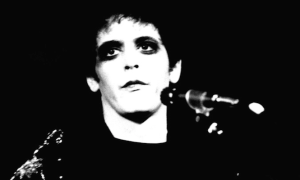On that fateful Sunday evening, as I was frantically mashing out an overdue essay, whispers of the news began to build on the internet, until the whispers were confirmed and the rumours became fact, allowing social media to reach it’s sombre mournful climax. Lou Reed was dead. Despite his seventy-one years, which were peppered with heavy drug and alcohol abuse, I was shocked. For me, Lou Reed has always been the archetypal symbol of constant survival and relentless drive, and to have this fearlessly transgressive influence suddenly extinguished stunned me more than I ever would have expected.
Lou Reed was involved in numerous musical ventures in his youth, before meeting John Cale and forming one of the most iconic bands of the 1960s, The Velvet Underground. Reed’s contribution to the band was outstanding, from the acerbic grit of his lyrics, to the unflinching view of the squalid events that he sang about. As well as songs like “Heroin” and “I’m Waiting For The Man” which dealt explicitly with the pleasure and pain of heavy opiate use, Reed also pushed the boundaries of censorship by singing about sadomasochism, (“Venus is Furs”) violence, homosexuality and transvestism (“Sister Ray”). Reed also drew upon the horrific events he experienced in his adolescence to write some of his solo work, in particular the trauma of undergoing electroconvulsive therapy to “cure” his bisexuality, which inspired the track “Kill Your Sons” in his album “Sally Can’t Dance”.

What also struck me was the overpowering sense of unity that arose after the announcement of Lou Reed’s death. Despite Reed’s avant-garde tendencies and his continual pushing of conventional musical boundaries, the unanimity of praise for someone with such progressive inclinations was surprising. Throughout Reed’s career his continual experimentation has led him to balance precariously on the tightrope between critical acclamation and denunciation. Reflecting on his lesser-known, experimental albums, we can see the duality of Reed’s artistic identity. On his double album set of “Metal Machine Music”, Reed created what one reviewer described as “the only recording that attacks the listener”, drenching the albums with droning guitar feedback at different speeds. However despite it’s critical failings, it sold 100,000 copies in the US. These conflicting views were also echoed in “Lulu”, a collaboration with Metallica that received mostly negative reviews, despite simultaneously being referred to as a “surprising triumph.” Although Reed’s career hasn’t been an immaculate run of critical adulation, this is exactly why we value Reed, not only for his music, but for himself. We can relate to the mess, the excess, and the eccentricities of his character, something that in this age of pre-packaged, plastic, X factor pop, is rare.
Lou Reed lived a turbulent, vivid, extraordinary life, which can’t even begin to be summarized for this article. He left behind a lasting legacy of music, and if we are to take anything from this, perhaps we should all learn to be a little more risky, and little less fearful, and much more radical. To those still suffering from the blow of losing Lou Reed, let his often disarmingly sweet, simple words console you: “These are really terribly rough times, and we really should try to be as nice to each other as possible.”
To see the original article click here.

